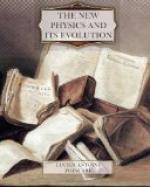I am not unaware that, as has often been said, contemporary history is the most difficult of all histories to write. A certain step backwards seems necessary in order to enable us to appreciate correctly the relative importance of events, and details conceal the full view from eyes which are too close to them, as the trees prevent us from seeing the forest. The event which produces a great sensation has often only insignificant consequences; while another, which seemed at the outset of the least importance and little worthy of note, has in the long run a widespread and deep influence.
If, however, we deal with the history of a positive discovery, contemporaries who possess immediate information, and are in a position to collect authentic evidence at first hand, will make, by bringing to it their sincere testimony, a work of erudition which may be very useful, but which we may be tempted to look upon as very easy of execution. Yet such a labour, even when limited to the study of a very minute question or of a recent invention, is far from being accomplished without the historian stumbling over serious obstacles.
An invention is never, in reality, to be attributed to a single author. It is the result of the work of many collaborators who sometimes have no acquaintance with one another, and is often the fruit of obscure labours. Public opinion, however, wilfully simple in face of a sensational discovery, insists that the historian should also act as judge; and it is the historian’s task to disentangle the truth in the midst of the contest, and to declare infallibly to whom the acknowledgments of mankind should be paid. He must, in his capacity as skilled expert, expose piracies, detect the most carefully hidden plagiarisms, and discuss the delicate question of priority; while he must not be deluded by those who do not fear to announce, in bold accents, that they have solved problems of which they find the solution imminent, and who, the day after its final elucidation by third parties, proclaim themselves its true discoverers. He must rise above a partiality which deems itself excusable because it proceeds from national pride; and, finally, he must seek with patience for what has gone before. While thus retreating step by step he runs the risk of losing himself in the night of time.
An example of yesterday seems to show the difficulties of such a task. Among recent discoveries the invention of wireless telegraphy is one of those which have rapidly become popular, and looks, as it were, an exact subject clearly marked out. Many attempts have already been made to write its history. Mr J.J. Fahie published in England as early as 1899 an interesting work entitled the History of Wireless Telegraphy; and about the same time M. Broca published in France a very exhaustive work named La Telegraphie sans fil. Among the reports presented to the Congres international de physique (Paris, 1900), Signor Righi, an illustrious Italian




